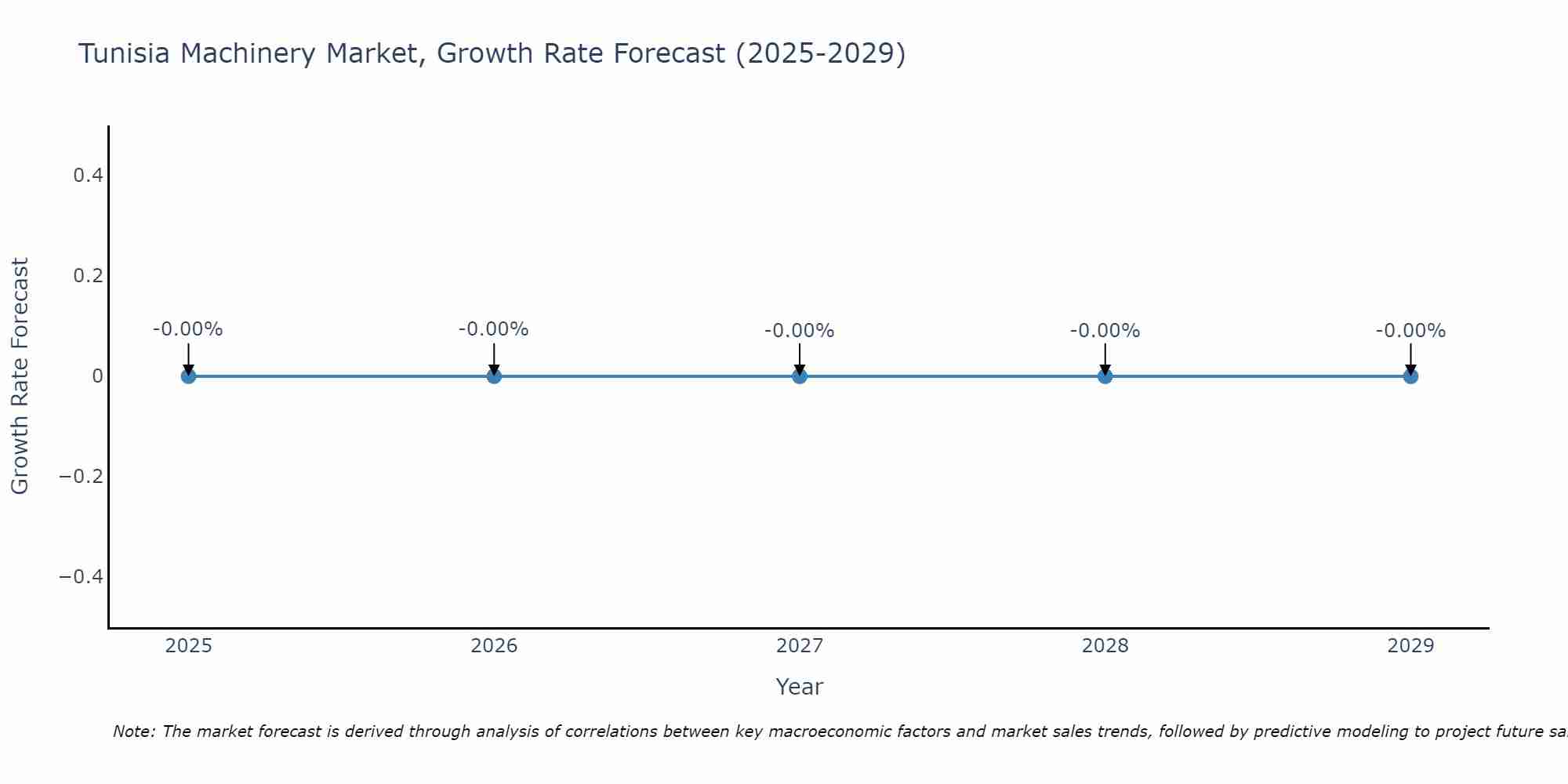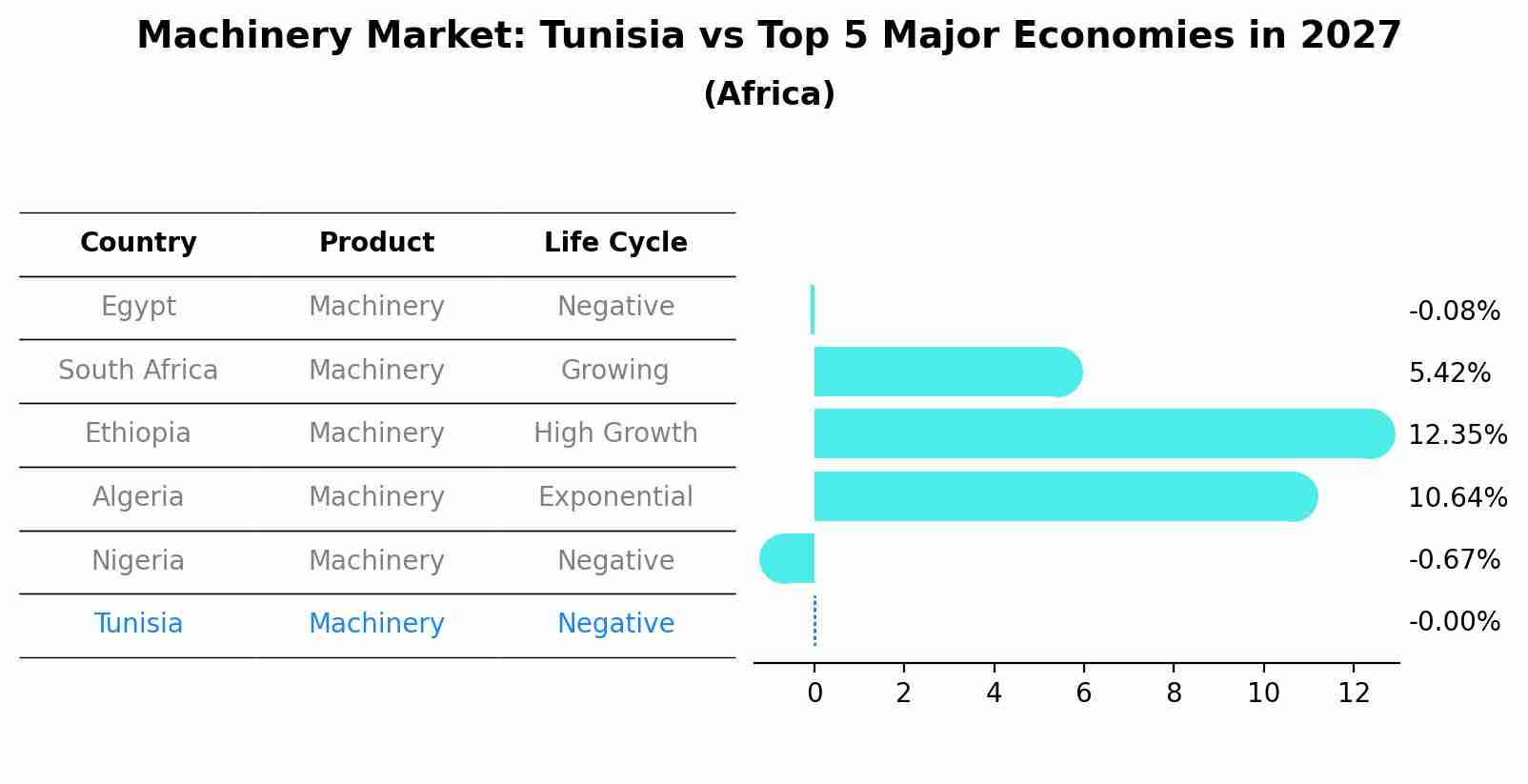Tunisia Machinery Market Outlook | Growth, Industry, Revenue, Trends, Share, COVID-19 IMPACT, Analysis, Value, Size, Forecast & Companies
| Product Code: ETC433190 | Publication Date: Oct 2022 | Updated Date: Jul 2025 | Product Type: Market Research Report | |
| Publisher: 6Wresearch | Author: Sumit Sagar | No. of Pages: 75 | No. of Figures: 35 | No. of Tables: 20 |
Tunisia Machinery Market Size Growth Rate
The Tunisia Machinery Market may undergo a gradual slowdown in growth rates between 2025 and 2029. Starting high at -0.00% in 2025, the market steadily declines to -0.00% by 2029.

Machinery Market: Tunisia vs Top 5 Major Economies in 2027 (Africa)
The Machinery market in Tunisia is projected to grow at a negative growth rate of -0.00% by 2027, highlighting the country's increasing focus on advanced technologies within the Africa region, where Egypt holds the dominant position, followed closely by South Africa, Ethiopia, Algeria and Nigeria, shaping overall regional demand.

Tunisia Machinery Market Synopsis
The Tunisia machinery market is characterized by a diverse range of sectors including agriculture, construction, and manufacturing. The country`s machinery market has been growing steadily due to increasing industrialization and infrastructure development projects. Agriculture machinery such as tractors and irrigation equipment are in demand to support the country`s agriculture sector. In the construction sector, there is a need for heavy machinery like excavators and cranes to support ongoing infrastructure projects. Additionally, the manufacturing sector requires machinery for various processes such as metalworking and plastics production. The market is competitive with both domestic manufacturers and international players catering to the demand. Government initiatives to promote industrial growth and foreign investment are expected to drive further expansion in the Tunisia machinery market.
Tunisia Machinery Market Trends
The Tunisia Machinery Market is experiencing several key trends. Firstly, there is a growing demand for advanced machinery with automation and digital capabilities to improve efficiency and productivity. Secondly, there is a shift towards sustainable and environmentally-friendly machinery as companies prioritize reducing their carbon footprint. Thirdly, there is an increasing focus on technology integration, such as Internet of Things (IoT) and data analytics, to enable predictive maintenance and optimize performance. Lastly, the market is witnessing a rise in partnerships and collaborations between local and international machinery manufacturers to enhance technology transfer and innovation. Overall, these trends indicate a dynamic and evolving landscape in the Tunisia Machinery Market with a strong emphasis on technology adoption and sustainability.
Tunisia Machinery Market Challenges
In the Tunisia Machinery Market, several challenges are faced, including economic instability, limited access to financing for machinery purchases, high import tariffs on machinery, and a lack of skilled labor in the sector. The economic instability in Tunisia has affected consumer confidence and investment in machinery, leading to fluctuating demand. Additionally, the high import tariffs on machinery make it expensive for businesses to acquire new equipment, hindering their competitiveness. Limited access to financing further exacerbates this issue, as businesses struggle to secure the necessary funds to invest in machinery upgrades. Moreover, the shortage of skilled labor in the machinery sector poses a challenge in terms of efficient operation and maintenance of machinery, limiting overall productivity and growth in the market. Addressing these challenges will be crucial for the development of the Tunisia Machinery Market.
Tunisia Machinery Market Investment Opportunities
The Tunisia Machinery Market presents promising investment opportunities across various sectors such as agriculture, construction, and manufacturing. With the government`s focus on industrial development and infrastructure projects, there is a growing demand for machinery and equipment in the country. Investors can explore opportunities in supplying agricultural machinery for modernizing farming practices, construction machinery for infrastructure projects, and manufacturing machinery for the expanding industrial sector. Additionally, there is potential in offering maintenance and repair services for existing machinery to cater to the market`s ongoing needs. With Tunisia`s strategic location as a gateway to the African market and ongoing efforts to improve the business environment, investing in the machinery sector can be a lucrative opportunity for investors looking to capitalize on the country`s economic growth.
Jordan Agar Market Government Policies
Government policies related to the Tunisia Machinery Market focus on promoting industrial development, fostering innovation, and enhancing competitiveness. The Tunisian government has implemented various measures to support the machinery sector, including providing incentives for investment, offering financial support for research and development activities, and facilitating access to credit for businesses in the industry. Additionally, the government has established regulations to ensure quality standards and safety requirements are met in the manufacturing and distribution of machinery products. These policies aim to drive growth in the machinery market, attract foreign investment, and create employment opportunities in Tunisia`s industrial sector.
Tunisia Machinery Market Future Outlook
The Tunisia Machinery Market is expected to witness steady growth in the coming years due to increasing industrialization and infrastructural development in the country. The government`s focus on promoting manufacturing sectors such as automotive, construction, and agriculture will drive the demand for machinery and equipment. Additionally, rising investments in renewable energy projects and the adoption of advanced technologies are likely to further boost the market. However, challenges such as limited access to financing and fluctuations in raw material prices may impact market growth. Overall, with favorable government initiatives and a growing economy, the Tunisia Machinery Market is projected to experience positive growth prospects in the foreseeable future.
Key Highlights of the Report:
- Tunisia Machinery Market Outlook
- Market Size of Tunisia Machinery Market, 2021
- Forecast of Tunisia Machinery Market, 2031
- Historical Data and Forecast of Tunisia Machinery Revenues & Volume for the Period 2018 - 2031
- Tunisia Machinery Market Trend Evolution
- Tunisia Machinery Market Drivers and Challenges
- Tunisia Machinery Price Trends
- Tunisia Machinery Porter's Five Forces
- Tunisia Machinery Industry Life Cycle
- Historical Data and Forecast of Tunisia Machinery Market Revenues & Volume By Type for the Period 2018 - 2031
- Historical Data and Forecast of Tunisia Machinery Market Revenues & Volume By Agriculture, Construction, And Mining Machinery for the Period 2018 - 2031
- Historical Data and Forecast of Tunisia Machinery Market Revenues & Volume By Industrial Machinery for the Period 2018 - 2031
- Historical Data and Forecast of Tunisia Machinery Market Revenues & Volume By Commercial And Service Industry Machinery for the Period 2018 - 2031
- Historical Data and Forecast of Tunisia Machinery Market Revenues & Volume By Ventilation for the Period 2018 - 2031
- Historical Data and Forecast of Tunisia Machinery Market Revenues & Volume By Heating for the Period 2018 - 2031
- Historical Data and Forecast of Tunisia Machinery Market Revenues & Volume By Air-Conditioning for the Period 2018 - 2031
- Historical Data and Forecast of Tunisia Machinery Market Revenues & Volume By Commercial Refrigeration Equipment for the Period 2018 - 2031
- Historical Data and Forecast of Tunisia Machinery Market Revenues & Volume By Distribution Channel for the Period 2018 - 2031
- Historical Data and Forecast of Tunisia Machinery Market Revenues & Volume By Supermarkets/Hypermarkets for the Period 2018 - 2031
- Historical Data and Forecast of Tunisia Machinery Market Revenues & Volume By Convenience Stores for the Period 2018 - 2031
- Historical Data and Forecast of Tunisia Machinery Market Revenues & Volume By E-Commerce for the Period 2018 - 2031
- Historical Data and Forecast of Tunisia Machinery Market Revenues & Volume By Others for the Period 2018 - 2031
- Historical Data and Forecast of Tunisia Machinery Market Revenues & Volume By Others for the Period 2018 - 2031
- Historical Data and Forecast of Tunisia Machinery Market Revenues & Volume By Nature for the Period 2018 - 2031
- Historical Data and Forecast of Tunisia Machinery Market Revenues & Volume By Organic for the Period 2018 - 2031
- Historical Data and Forecast of Tunisia Machinery Market Revenues & Volume By Conventional for the Period 2018 - 2031
- Tunisia Machinery Import Export Trade Statistics
- Market Opportunity Assessment By Type
- Market Opportunity Assessment By Distribution Channel
- Market Opportunity Assessment By Nature
- Tunisia Machinery Top Companies Market Share
- Tunisia Machinery Competitive Benchmarking By Technical and Operational Parameters
- Tunisia Machinery Company Profiles
- Tunisia Machinery Key Strategic Recommendations
Frequently Asked Questions About the Market Study (FAQs):
Export potential assessment - trade Analytics for 2030
Export potential enables firms to identify high-growth global markets with greater confidence by combining advanced trade intelligence with a structured quantitative methodology. The framework analyzes emerging demand trends and country-level import patterns while integrating macroeconomic and trade datasets such as GDP and population forecasts, bilateral import–export flows, tariff structures, elasticity differentials between developed and developing economies, geographic distance, and import demand projections. Using weighted trade values from 2020–2024 as the base period to project country-to-country export potential for 2030, these inputs are operationalized through calculated drivers such as gravity model parameters, tariff impact factors, and projected GDP per-capita growth. Through an analysis of hidden potentials, demand hotspots, and market conditions that are most favorable to success, this method enables firms to focus on target countries, maximize returns, and global expansion with data, backed by accuracy.
By factoring in the projected importer demand gap that is currently unmet and could be potential opportunity, it identifies the potential for the Exporter (Country) among 190 countries, against the general trade analysis, which identifies the biggest importer or exporter.
To discover high-growth global markets and optimize your business strategy:
Click Here- Single User License$ 1,995
- Department License$ 2,400
- Site License$ 3,120
- Global License$ 3,795
Search
Thought Leadership and Analyst Meet
Our Clients
Related Reports
- Saudi Arabia Car Window Tinting Film, Paint Protection Film (PPF), and Ceramic Coating Market (2025-2031) | Strategy, Consumer Insights, Analysis, Investment Trends, Opportunities, Growth, Size, Share, Industry, Revenue, Segments, Value, Segmentation, Supply, Forecast, Restraints, Outlook, Competition, Drivers, Trends, Demand, Pricing Analysis, Competitive, Strategic Insights, Companies, Challenges
- South Africa Stationery Market (2025-2031) | Share, Size, Industry, Value, Growth, Revenue, Analysis, Trends, Segmentation & Outlook
- Afghanistan Rocking Chairs And Adirondack Chairs Market (2026-2032) | Size & Revenue, Competitive Landscape, Share, Segmentation, Industry, Value, Outlook, Analysis, Trends, Growth, Forecast, Companies
- Afghanistan Apparel Market (2026-2032) | Growth, Outlook, Industry, Segmentation, Forecast, Size, Companies, Trends, Value, Share, Analysis & Revenue
- Canada Oil and Gas Market (2026-2032) | Share, Segmentation, Value, Industry, Trends, Forecast, Analysis, Size & Revenue, Growth, Competitive Landscape, Outlook, Companies
- Germany Breakfast Food Market (2026-2032) | Industry, Share, Growth, Size, Companies, Value, Analysis, Revenue, Trends, Forecast & Outlook
- Australia Briquette Market (2025-2031) | Growth, Size, Revenue, Forecast, Analysis, Trends, Value, Share, Industry & Companies
- Vietnam System Integrator Market (2025-2031) | Size, Companies, Analysis, Industry, Value, Forecast, Growth, Trends, Revenue & Share
- ASEAN and Thailand Brain Health Supplements Market (2025-2031) | Strategy, Consumer Insights, Analysis, Investment Trends, Opportunities, Growth, Size, Share, Industry, Revenue, Segments, Value, Segmentation, Supply, Forecast, Restraints, Outlook, Competition, Drivers, Trends, Demand, Pricing Analysis, Competitive, Strategic Insights, Companies, Challenges
- ASEAN Bearings Market (2025-2031) | Strategy, Consumer Insights, Analysis, Investment Trends, Opportunities, Growth, Size, Share, Industry, Revenue, Segments, Value, Segmentation, Supply, Forecast, Restraints, Outlook, Competition, Drivers, Trends, Demand, Pricing Analysis, Competitive, Strategic Insights, Companies, Challenges
Industry Events and Analyst Meet
Whitepaper
- Middle East & Africa Commercial Security Market Click here to view more.
- Middle East & Africa Fire Safety Systems & Equipment Market Click here to view more.
- GCC Drone Market Click here to view more.
- Middle East Lighting Fixture Market Click here to view more.
- GCC Physical & Perimeter Security Market Click here to view more.
6WResearch In News
- Doha a strategic location for EV manufacturing hub: IPA Qatar
- Demand for luxury TVs surging in the GCC, says Samsung
- Empowering Growth: The Thriving Journey of Bangladesh’s Cable Industry
- Demand for luxury TVs surging in the GCC, says Samsung
- Video call with a traditional healer? Once unthinkable, it’s now common in South Africa
- Intelligent Buildings To Smooth GCC’s Path To Net Zero


















